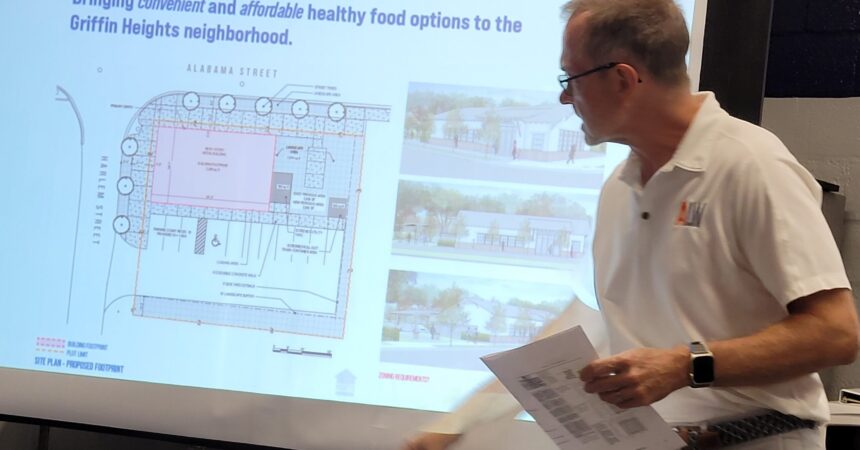
‘We need food …’
Griffin Heights residents make their case for a grocery store

Photo by St. Clair Murraine

Photo by St. Clair Murraine

Photo by St. Clair Murraine
By St. Clair Murraine
Outlook Staff Writer
Before Theresa Saylor spoke up from a back row, it seemed many people in the room weren’t ready to hear about options that came up during a community engagement meeting.
Several people from the Griffin Height neighborhood and surrounding areas packed into a meeting room at the Lawrence-Gregory Community Center. They came last Tuesday evening to get an update on the city’s plan for replacing a grocery store at 1309 Alabama Street.
Saylor could have been speaking for those who had questions about what’s being laid out for their neighborhood.
“We need a grocery store; one that is going to give back to our community,” Saylor said. “We need food and we need jobs. Simple. It’s simple.”
Residents of the Griffin Heights area have been without a nearby grocery story since Wynn Dixie closed its Tharpe Street location in 2018. The closest full-service grocery stores are more than two miles away at a GreenWise on Gaines Street and Publix near Lake Ella.
Griffin Heights is one of several neighborhoods in the 32304 zip code that are considered food deserts.
Rudy Ferguson, pastor of New Birth Tabernacle in Griffin Heights, said Dollar General and Family Dollar stores in the area aren’t substitutes for a grocery store.
“We need this place,” said Ferguson, who has announced his candidacy for a city commission seat. “In my estimation, it should be a good grocery store. We should have the voices in this room, people who live in this community, to make decisions about what goes in this building. Not from the outside.
“I think everybody would agree with me when I say let’s turn this into a grocery store; stick with what we originally talked about. Let’s skip all the whistles and the bells and just put the necessary things in there. Let’s not make this more complicated than what it was set out to be.”
The process for having a grocery store would take time, though. Representatives from the city’s Neighborhood Services and Architects Lewis and Whitlock essentially said the meeting was more about fact-finding.
Renderings of what the new grocery store would look like were on display, as Cam Whitlock, a partner with the architectural firm, outlined some options. They include razing the old green 4,900-square foot building and replacing it with a new one that’s 2,500 square feet.
Some attendees raised concern when Whitlock explained that options include an entrance off Alabama Street, with 10 spaces in a parking lot at the back of the building. Whitlock also fielded questions about the type of material that will be used.
Concerns about procurement for a contractor of the building, a timeline and operator for the store were also raised.
However, attendees were assured that suggestions, which they were encouraged to submit on comment cards, would be considered before final decisions are made.
Whenever the project is completed, there won’t be a shortage of fresh food for the store, said Miaisha Mitchell, co-founder of the Tallahassee Food Network. Several farmers in the Frenchtown area are working their gardens to be ready to supply the store, she said.
“I’m excited,” she said. “Very excited because I recognize that it took us a long time to get here. But we know this is going to help us.
“The vision that I see is having, not only a grocery store that’s fully functional, but also a multi-purpose unit.”
The project is budgeted for just over $1 million. That money is part of $6 million that the City Commission approved in 2021 for the Frenchtown-Griffin Heights Neighborhood First Plan. It is one of three such plans that commission approved for community development.
The property where the brittle green building now sits was purchased by the Blueprint Intergovernmental Agency, which is comprised of City and Leon County Commissioners. The city took over the property last spring.
The groundwork for bringing change to the area started when the Neighborhood First initiative took shape in 2018. At the forefront was Rodney Landers, chairman of the Community Action Team and a member of the Griffin Heights Neighborhood Association.
When the city commission approved funding for the Neighborhood First Plan, Landers declared that “We don’t plan to have a third-rate anything.”
His attitude was the same last Tuesday. He expressed concern that through the engagement meeting the city has circumvented the purpose of having the Community Action Team. That organization should be leading the fact-finding, he said.
Ashley Edwards, the city’s director of Parks, Recreation and Neighborhood Service, said the Neighborhood First Plan is community driven. Any other perception is inaccurate, she said.
“I hate that any of them feel excluded because that’s not what we are trying to do,” Edwards said. “We are trying to get their feedback (and) input and incorporate that into the project.”
City Commissioner Curtis Richardson, who attended the meeting, said Griffin Heights residents will ultimately get what they want.
“The message that we were trying to get across tonight is that this isn’t even the last (meeting),” Richardson said. “There will be information on the (city’s) website. We want to make sure that it is the residents and stakeholders of this community that’s giving us that input.
“I think we heard that tonight. Everybody agreed that what they want is a grocery store. All they want now is a place where they can go buy groceries for their families and not have to go miles away.”







